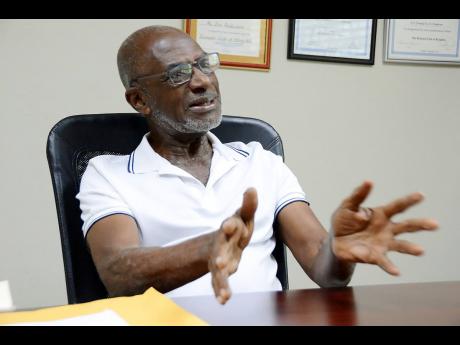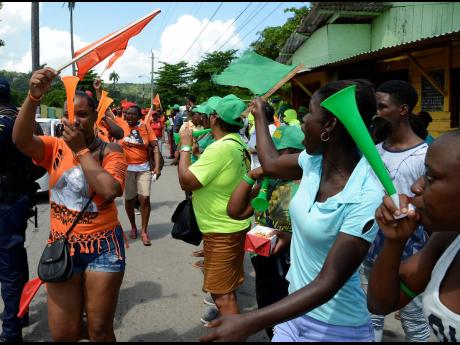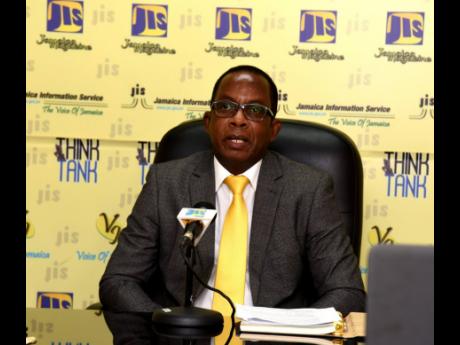38% of J’cans intend to vote in local gov’t elections, poll finds
For general election, 51% say ‘issues’ will be the deciding factor to cast their ballot
A just-concluded poll conducted by leading market researcher Don Anderson has revealed that more Jamaicans are likely to vote in the upcoming local government elections than those who voted in the 2020 general election. At the same time, just over...
A just-concluded poll conducted by leading market researcher Don Anderson has revealed that more Jamaicans are likely to vote in the upcoming local government elections than those who voted in the 2020 general election.
At the same time, just over 50 per cent noted that issues of national importance will drive their decision in the next general election.
The poll, with a sample size of 1,015, which was conducted in all parishes between November 24 and December 7 this year, among registered voters 18 years and older, showed that 38 per cent of Jamaicans have signalled their intention to vote in the long-overdue local government elections, which are expected to be called by February 2024.
Twenty-two per cent said they were not sure yet, while 40 per cent were unequivocal. They were not voting. The ‘not voting’ category is in keeping with voting trends over the last six municipal polls, since 1990, which have seen significant declines, resulting in a 30.6 per cent voter turnout in 2016. If the 38 per cent voter intent holds, it would see an increase of 7.4 per cent over the 2016 numbers.
MOST PERSONS PLAN TO VOTE ON ISSUES
On the issue of the most important factors for voters, particularly as it relates to the general election, Anderson said he noticed an interesting, new trend.
“The majority of persons interviewed say that they will be more motivated by the issues that are raised in an election campaign than any other factor,” he shared.
When asked, “What of the following is the most important factor to you when you go out to vote? Is it the party, the party leader, the candidate, the MP, or the issues?”, 51 per cent of the respondents said they would be voting on issues; 18 per cent said they would be voting for the party; 11 per cent said it would be based on the candidate or member of parliament (MP); 11 per cent would vote on how they can benefit; and nine per cent would vote because of the party leader.
“Traditionally, people vote on party, candidates, promises, etc., and not so much on issues. But now you have a situation where a significant number of people said they would vote on issues. That is exactly what we have been noticing as a new trend. And it feeds into the thought that I have been expressing that we have become much less leader-centric,” Anderson explained, adding that he believes this is “a healthy direction in which to go”.
He said when individuals were asked what are the big issues, they were unanimous in saying “crime, roads and water”, followed by unemployment.
POLL COMMISSIONED TO GENERATE PUBLIC DISCUSSION
Anderson’s Market Research Services Limited was commissioned to do the poll on issues of national importance by “a group of people with a company registered on the [Jamaica] Stock Exchange but who did not want to be named”, the results of which were shared with The Sunday Gleaner.
In an interview with The Sunday Gleaner yesterday, Anderson made it clear that he was not told what questions to include in the recent survey, nor was he given any questions by the special interest group.
“I was asked to do a survey and was told ‘we don’t care what kind of questions you put in it. We trust you enough to say you understand what are the national issues, and therefore you will probe it. We don’t want to use any questionnaire, we will pay, because we want to have a lot of data in the public for discussion’,” the pollster said.
He said the individuals were clear that “they were neither Jamaica Labour Party (JLP) nor People’s National Party (PNP) supporters, and considered themselves patriotic Jamaicans … But they don’t want to be identified, because they don’t want to be labelled PNP or JLP”.
ACTUAL VOTER TURNOUT MAY BE DIFFERENT
Noting that it was highly unlikely that the turnout for the local government elections would top the 37 per cent for the 2020 general election, the veteran pollster explained that “historically, the incidences of persons who say they are going to vote change downwards. So they don’t turn out for one reason or the other – people pay them to stay away, they couldn’t get to the polling station, rain fall, they are just disenchanted, they can’t make up their minds, and so on. So the intention to vote is generally higher than the actual turnout”.
Anderson continued, “Mark you, there is a lot more interest in local government now because it’s so protracted and has fuelled a lot of discussion. So that is also feeding into that 38 per cent, which would be much higher than those who voted the last time.”
Of the unsure 22 per cent, he said that number usually moves very little as they represent “a hardcore” set who, when asked what would encourage them to come out to vote, “70 per cent of them would say nothing”. Anderson said they really do not intend to vote, but opt for “not sure”.
He also noted that he expects the 40 per cent in the ‘not voting’ category to increase.
“Some of the ‘not sure’ will become ‘no vote’. And some of the ‘yes’ will become ‘no’ and increase that number. The incidence of persons who will turn out to vote will not reach 40 per cent,” he told Th e Sunday Gleaner.
Still, he was optimistic that the interest and discussions around the elections could result in increased voter turnout, noting that the profile of the persons most likely to vote in these elections is “more males than females and older persons in the 45-54, 55-64 and 65 and over”.
Data provided by the Electoral Office of Jamaica showed that voter turnout in the 1990 local government elections was 56.02 per cent, and has been dwindling since. In 1998, it was 34.45 per cent; in 2003, 40.09 per cent; 2007 was 37.92 per cent; 2012 recorded 34.73 per cent; and 30.06 per cent turned out in 2016.
The downward spiral has also impacted the general election, with the 2020 election recording the lowest turnout since 1944, at 37 per cent.
‘38 PER CENT WOULD BE ENCOURAGING’
For Director of Elections Glasspole Brown, a 38 per cent voter turnout for the upcoming local government elections would be encouraging.
“We have put a public education campaign programme together and we will be out there in the public, starting in early January. The 38 per cent would be encouraging, compared to what happened in 2016 and 2020, but that is not where we want it to be. We are not satisfied with that sort of turnout,” the elections director told The Sunday Gleaner.
“We would like to have a much higher turnout and get a lot more persons involved in the voting process.”
Former junior minister in the Ministry of Local Government, Colin Campbell, said he was not surprised by the poll findings, but he was quick to note that most persons were not interested in voting in the local government elections because it did not change the government or significantly impact policy.
“I don’t find the numbers surprising. And I especially don’t find it surprising that issues are a big deal for voters. Crime is the number-one issue of most Jamaicans. Roads, unemployment, corruption are lumped as part of the issues, so I am not surprised by the findings. Not surprised at all,” Campbell told The Sunday Gleaner yesterday.
The margin of error for the survey was plus or minus three per cent at the 95 per cent confidence level, Anderson said, adding that it is likely that another poll will be conducted before the elections.



